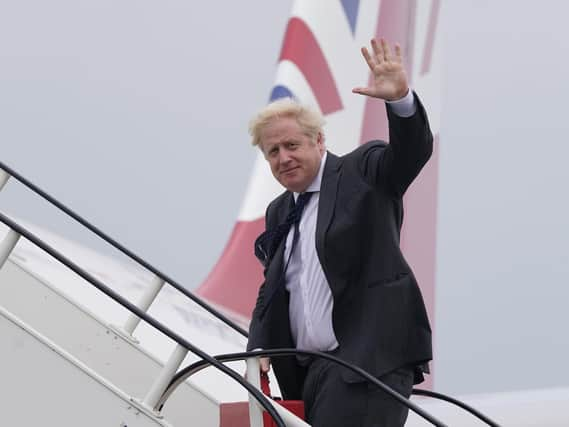Boris Johnson’s new Government ignores presentation and communication at its own expense - Bernard Ingham


PERHAPS the best one can say of Boris Johnson’s new Government is that it looks a bit livelier than the old.
But prudence demands we reserve judgment until we see how Ministers perform when they get their feet under the table.
Advertisement
Hide AdAdvertisement
Hide AdWe should also recognise that collectively they face a mammoth task with a huge budget deficit of £300bn and every public service you can think of in need of reform or renewal.
At least the Opposition seems unlikely to derail them, with Labour leader Sir Keir Starmer re-launching himself with a 14,000-word essay that few will read except to tear apart.
It may not rank with Michael Foot’s “longest suicide note in history” but can its essence be distilled on to the single sheet of paper required by Winston Churchill?
In short, not much seems to have changed at the start of a new political year since the PM has again ignored responsibility for presentation and communication in his reshuffle.
Advertisement
Hide AdAdvertisement
Hide AdWhile press secretary in No 10, I served five Ministers charged with keeping an eye on presentation – Angus Maude, the only one designated as such, John Biffen, John Wakeham, Willie Whitelaw and John Major.
Perhaps the appointments were the result of collective wisdom in the face of Margaret Thatcher’s entirely untenable view: “Get the policy right and presentation will take care of itself.”
I had the temerity to remind her of this fallacy when the poll tax came along.
All those Ministers, with the exception of Biffen, who took not the slightest interest, worked hard to help me present a coherent case to the public.
Even then, it sometimes looked a mess. But we tried.
Advertisement
Hide AdAdvertisement
Hide AdIt is difficult to believe that any effort is being made today, given Boris’s tendency to busk it, the anomalies and contradictions in the Government’s handling, notably of the pandemic, and No 10’s propensity for contradicting Ministers.
This is not to mention the regularity with which Boris and, for example, Home Secretary Priti Patel, promise the earth without much by way of return.
Suffice it to say, I wouldn’t bet on Boris beating Mrs Thatcher’s 11.5 years in No 10 unless he smartens up his Government’s presentation.
And that may be asking too much of him, given his entirely undisciplined, though sometimes endearing, approach to life.
Advertisement
Hide AdAdvertisement
Hide AdIt may also be asking too much of the Government machine, even if it is much larger than in my time, primarily because of the advent of the internet and the tyranny of the social media.
The overriding need for “rapid rebuttal” has been a fine recruiting sergeant since Peter Mandelson and Alastair Campbell got their hands on the Government Information (now Communications) Service over 20 years ago.
I once counted 53 people employed in No 10 on communications – six of them in my old office organising tours and visits. I had a total of eight, including myself, doing the lot.
It was never for Mandelson and Campbell to observe the constitutional requirement of our Cabinet system of Government that power is dispersed so that, for example, departmental heads of information owe their first loyalty to their Cabinet Minister not the PM.
Advertisement
Hide AdAdvertisement
Hide AdSince then we have had more centralisation from Dominic Cummings without the slightest improvement in performance.
Alongside this we have seen the growth of SPADS – special advisers – who are often political apprentices paid by the taxpayer.
Worse still, there are media SPADS whose activities are devoted to the greater grandeur of their Minister rather than the standing of the Government.
It is, of course, fair to say that we in the old Government Information Service did not seek to damage our Ministers, although maintaining the credibility of the Government often required some very frank advice to them.
Advertisement
Hide AdAdvertisement
Hide AdIn other words, it is not just Boris’s untidy way of working that makes the public wonder who is in charge and whether it is remotely concerned with what it looks like.
The system as I knew it – a system that generally worked with the help and clout of the designated senior Minister – has gone to pieces.
It follows that reform of Government communications should be in Boris’s urgent in-tray. It holds out the promise of financial savings, more credibility and more votes.
And if, dear reader, you know of an experienced go-getting politician in the Commons or Lords who could and would take Government communications by the scruff of the neck hold your peace no longer.
He or she – if they exist – is urgently needed.